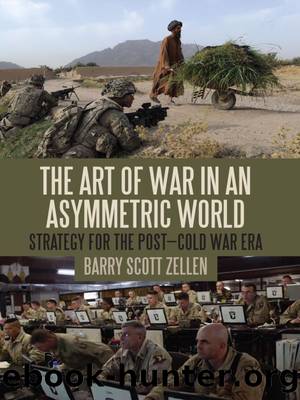The Art of War in an Asymmetric World: Strategy for the Post-Cold War Era by Barry Scott Zellen

Author:Barry Scott Zellen [Zellen, Barry Scott]
Language: eng
Format: epub
Tags: Political Science, Security (National & International), International Relations, General, Terrorism
ISBN: 9781441195555
Google: tjqtWwEE6mAC
Goodreads: 14620026
Publisher: A&C Black
Published: 2012-06-28T00:00:00+00:00
Netcentric versus Population-Centric War: Debate or Dialectic?
Another debate raged across the blogosphere in 2007 after an intriguing though controversial article appeared in the pages of Wired magazine authored by Noah Shachtman, looking critically at the legacy of Vice Admiral Cebrowskiâs conceptualization of NCW, and how the postwar challenges in Iraq and Afghanistan (and the accompanying rise in population-centric COIN theory) appeared to present a vociferous reality check, thereby questioning the very premise of NCW. The controversy that swirled pitted advocates of COIN, including leading population-centric warfare theorist Nagl, against the principal architects of Americaâs âShock and Aweâ campaign and its underlying strategic framework of NCW as developed by Cebrowski, including his former deputy and widely read theorist of war (famous for his conceptualization of nonintegrated Gap and integrated Core states), Thomas P. M. Barnett.
But when the dust settled from this blog fight between net-centricity and population-centricity, it became clear that Shachtmanâs critical analysis presented less of a knockout blow aimed at NCW and more of a synthesis of two doctrines that more often than not are pitted against one another in the long tradition of doctrinal polarization of the sort witnessed between Clausewitzian disciples and their Jominian counterparts. In fact the new complexity of war manifests a frustrating but seemingly permanent blurring of these two approaches to war, with population-centric nationbuilding activities taking place in one region and kinetic operations taking place in another, not unlike the concept of the âThree Block Warâ first enunciated by US Marine Corps General and former Commandant Charles Chandler Krulak and which has formally undergirded Canadian defense policy since 9/11, informed by Ottawaâs often lonely deployment to the Kandahar region of Afghanistan during the years when American forces were preoccupied with the chaotic war in Iraq. Ottawa found itself simultaneously engaged in kinetic and population-centric warfare activities, and recognized this inherent contradiction in its mission, one that the recent debate that has raged between NCW and COIN advocates suggests has not yet been fully synthesized by American defense intellectuals, who are still staking one corner or the other in this polarized doctrinal fight. An even broader doctrinal debate has raged in the pages of military journals, magazines, and websites between the proponents of kinetic operations more generally (and not just the lighter-footprinted, higher-tech, NCW variant), and the population-centric COIN theorists, as we have seen in several military publications, particularly the pointâcounterpoint debate between Nagl and Gentile that appeared in JFQ.
We will take a brief look at how the 2007 debate between NCW and COIN played out, first examining Shachtmanâs article, then Thomas P. M. Barnettâs critical response and defense of his mentor Cebrowski, after which we will contextualize the debate and its effort to describe a complex and often chaotic reality, and find a map from chaos to order (not unlike the map made famous by Barnett in his seminal work, The Pentagonâs New Map, which elaborated upon his shorter article-length discussion in Esquire in 2003). His conceptualization of the integrated Core confronted by
Download
This site does not store any files on its server. We only index and link to content provided by other sites. Please contact the content providers to delete copyright contents if any and email us, we'll remove relevant links or contents immediately.
The Secret History by Donna Tartt(19053)
The Social Justice Warrior Handbook by Lisa De Pasquale(12187)
Thirteen Reasons Why by Jay Asher(8893)
This Is How You Lose Her by Junot Diaz(6877)
Weapons of Math Destruction by Cathy O'Neil(6265)
Zero to One by Peter Thiel(5787)
Beartown by Fredrik Backman(5737)
The Myth of the Strong Leader by Archie Brown(5500)
The Fire Next Time by James Baldwin(5431)
How Democracies Die by Steven Levitsky & Daniel Ziblatt(5215)
Promise Me, Dad by Joe Biden(5141)
Stone's Rules by Roger Stone(5081)
A Higher Loyalty: Truth, Lies, and Leadership by James Comey(4954)
100 Deadly Skills by Clint Emerson(4921)
Rise and Kill First by Ronen Bergman(4780)
Secrecy World by Jake Bernstein(4741)
The David Icke Guide to the Global Conspiracy (and how to end it) by David Icke(4709)
The Farm by Tom Rob Smith(4502)
The Doomsday Machine by Daniel Ellsberg(4484)
